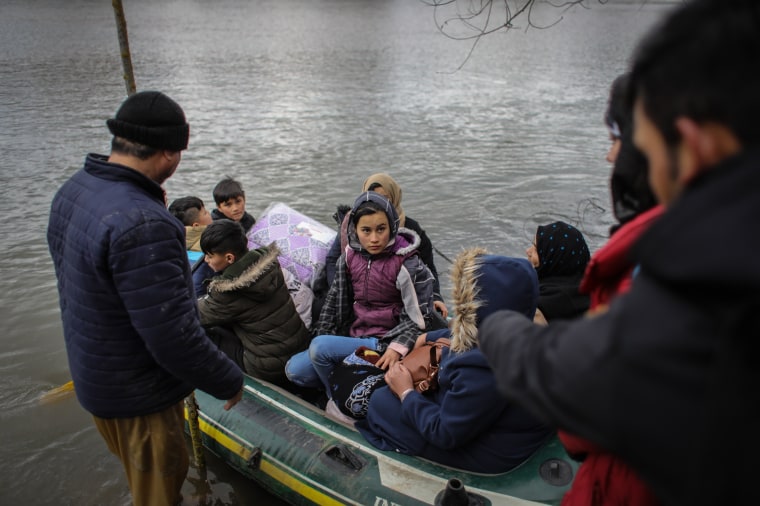The Syrian refugee crisis moved closer to the European Union's doorstep Saturday after Turkey's President Recep Tayyip Erdogan said he would open his country's borders.
In a televised address less than 48-hours after at least 33 Turkish soldiers were killed in an airstrike by forces loyal to Syrian President Bashar al-Assad, Erdogan said: “We will not close these doors in the coming period and this will continue," according to the Reuters press agency.
"Why?" he added. "The European Union needs to keep its promises. We don’t have to take care of this many refugees, to feed them."
Almost immediately, convoys of people began heading to the Greek land and sea borders.
Live images from Greece's Skai TV on the Turkish side of the northern land border at Kastanies showed Greek riot police firing teargas rounds at groups of migrants who were hurling stones and shouting obscenities.
The Greek government reiterated its promise to keep migrants out, and the country's Prime Minister Kyriakos Mitsotakis tweeted: "I want to be clear: no illegal entries into Greece will be tolerated. We are increasing our border security."
In a second tweet, he added: “Greece does not bear any responsibility for the tragic events in Syria and will not suffer the consequences of decisions taken by others."
Greek government spokesman Stelios Petsas later told reporters that authorities had thwarted 4,000 people attempting to cross its borders.
In return for E.U. funds, Turkey agreed to step up efforts to halt the flow of hundreds of thousands refugees passing through the country and into Europe, mainly via Greece and Bulgaria.
Turkey has since argued that the E.U. has not held up its end of the bargain in terms of aid assistance.
“We are telling the world community, ‘give us a helping hand’ and nobody is," Ilbur Çevik, Erdogan's chief adviser, told the BBC on Saturday.
While it has opened its borders on one side of the country, it has been beefing up its forces on the border with Syria.
A recent advance by Syrian forces into the northwestern province of Idlib, the country’s last rebel stronghold, has pushed nearly 950,000 displaced civilians towards the Turkish border amid cold winter weather.
President Assad’s forces have battled Turkish-backed fighters in the northwestern province of Idlib for years, but in recent days they have been directly targeting each other's troops.
Erdogan and Russian President Vladimir Putin spoke by telephone Friday and discussed implementing agreements in Idlib, the Kremlin said.
Fahrettin Altun, Erdogan's director of communications, added that they had agreed to meet "as soon as possible."
Erdogan also spoke with other world leaders, including President Donald Trump and German Chancellor Angela Merkel.
